Surprise clause in coalition deal says move to make the gendarmerie force ‘an independent service,’ subject it to authority of national security minister, to occur within 90 days

The far-right Otzma Yehudit faction has secured an agreement from incoming prime minister Benjamin Netanyahu’s Likud party to slice off the Border Police from the Israel Police and place the gendarmerie force under the direct control of new national security minister Itamar Ben Gvir, according to the coalition deal the two parties inked Wednesday.
The agreement states that the move will be made within 90 days of the government’s formation, “turning it into an independent service in similar status to the Israel Prison Service and subjecting it to the authority of the minister.”
The Border Police will subsequently answer to the national security minister directly, giving Ben Gvir control over a force that carries out sensitive operations in the West Bank, is in charge of quelling Palestinian riots and protests, and responsible for policing demonstrations within Israel as well.
Previously, it was thought that Ben Gvir would be given greater jurisdiction over Border Police in the West Bank, usually under the purview of the defense minister. The broader clause removing the entire force from under the police chief and offering the minister direct control was revealed only on Wednesday, once the full deal was published.
The deal does not further elaborate on the transfer of control over the Border Police, which was included in a clause calling for the government to pass legislation to significantly bolster the recently created Israel National Guard unit through dedicated budgets and organizational infrastructure. The unit is made up of Border Police forces.
Earlier Wednesday, the Knesset passed a law cementing broad political control over the force, as Ben Gvir demanded as a condition of joining Netanyahu’s government.
Amending existing police regulations, the law states that the government has “authority” over the Israel Police. It places Ben Gvir, as incoming national security minister, “in charge of” the force on behalf of the government.

The law explicitly grants Ben Gvir the authority to direct general police policy and to outline “general principles for action.” He can also influence policy relating to investigations, after consulting with the police commissioner and hearing the attorney general’s opinion.
Even more explosive provisions to make the police commissioner formally subordinate to Ben Gvir, as well as give the minister free rein to develop policy on investigations and police prosecution, were removed from the law in response to pressure from the attorney general’s office, which objected to the clauses’ undermining of the independence of the police force.
Ben Gvir has said he plans to pursue the legislation of those policies at a later date.
Critics of the move to hand over police control to Ben Gvir, including outgoing Defense Minister Benny Gantz, have warned that his new authority could seriously harm Israel’s security.
Ben Gvir has repeatedly challenged the police’s independent command structure, pushing to slacken open-fire rules to permit security forces to shoot anyone holding a stone or firebomb. He also said he wants to increase legal immunity for security forces.
Military open-fire rules are currently decided by IDF commanders, and for police by their own respective chain of command. Border Police forces in the West Bank, however, are subordinate to the military and follow its open-fire rules.

Ben Gvir never served in the military but has gained popularity with a promise to return personal security amid a spate of terror attacks this year, internal violence sparked by the May 2021 conflict, and alleged lack of governance in Israel’s rural north and south.
In the lead-up to the November 1 election, Ben Gvir campaigned with a tough-on-crime and tough-on-terror message.
To push his internal security and law-and-order agenda, Ben Gvir argued that he wanted more control over setting police policies and priorities, in line with the principle that the minister holding responsibility for a post should have concomitant authority.
During the days of committee discussion ahead of Wednesday’s vote to grant him expanded powers, Ben Gvir said that he believes increased ministerial power would help him better battle perennial societal plagues, including protection-money schemes in the south, vandalism against farmers, lawlessness on the roads, and harassment of women.
In addition to expanding political authority over the police, the newly passed law will increase transparency by publishing non-classified police regulations and Ben Gvir’s policies online.
The law is likely to be the first of several moves by Ben Gvir to expand political control over policing, as well as attempts to reform operational regulations.
As reported by The Times of Israel
